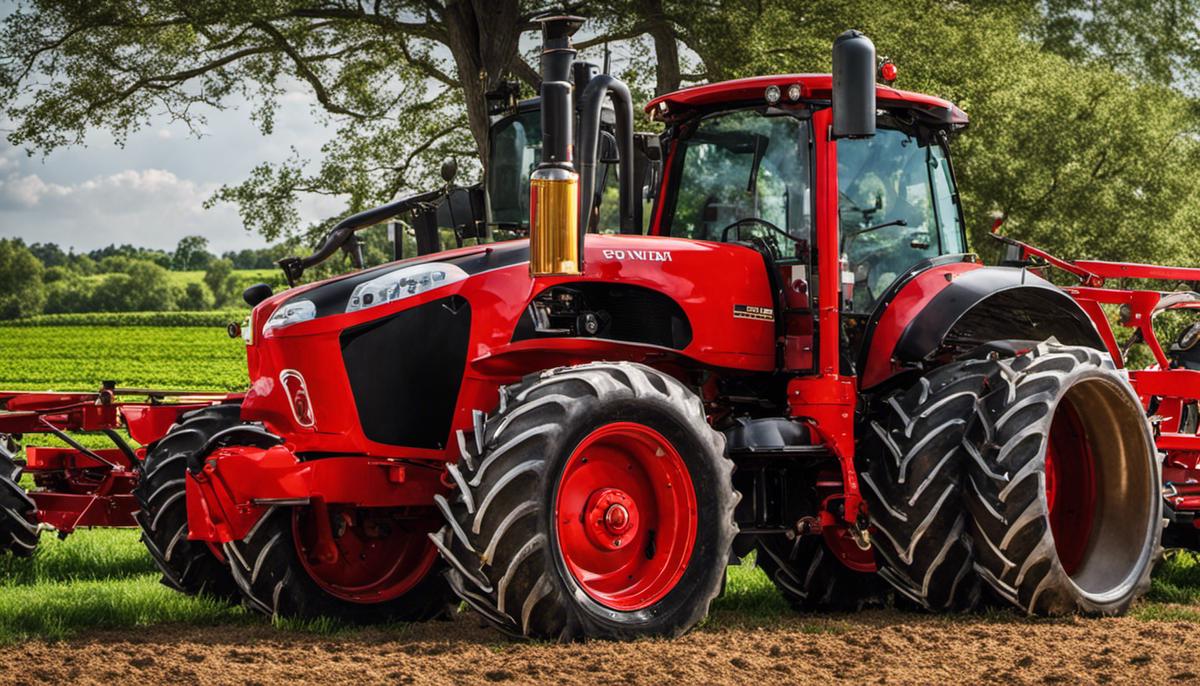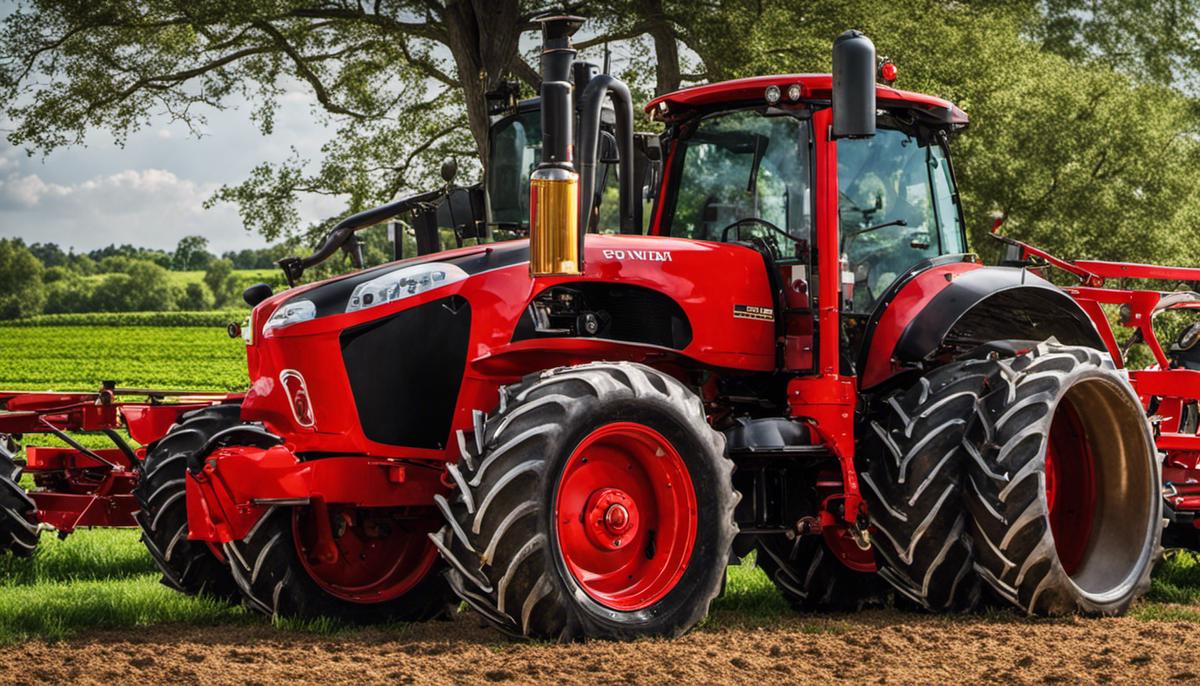
Modern Farm Equipment 2023
Description: Agriculture has been the backbone of human civilization, providing sustenance and paving the way for societal expansion. Throughout history, farming practices have evolved greatly, predominantly due to the rapid development and modernization of farm equipment. Guiding us on this agricultural journey is the utilization of advanced machines like tractors, harvesters, and plows which have greatly transformed this once painstaking and manually intensive labor into a more efficient and productive endeavour. Today, elements such as technology, safety measures, choice of equipment, and upcoming trends greatly influence farming practices, shaping the otherwise traditional activity into a highly mechanized and optimized process. In the world of today's farming landscape, technology plays an imperative role in enhancing productivity. Over the past decades, we've seen an incredible shift from manual labor to mechanized practices, redefining farming as we know it. For those who enjoy exploring the fascinating world of agriculture, it's essential to understand the pivotal categories of modern farm equipment and their significance in increasing output. Start with tractors, the veritable backbone of modern farming. These versatile machines perform a bevy of tasks, equipped with immense horsepower for tilling, plowing, and pulling various implements. The recent designs are more powerful, efficient, and comfortable, complete with GPS and features that make precision farming a reality, maximizing yield while conserving resources. Next, come the combine harvesters—these are the true workhorses during the harvest season. They combine the tasks of reaping, threshing, and winnowing, effectively reducing the amount of time and effort required in harvesting crops. They're the epitome of productivity tools, ensuring that the greatest possible amount of yield is gathered in the least amount of time. Planters also take a prominent spot in the lineup of modern farm equipment. This apparatus allows for the precise placing of seeds at specific intervals, providing optimal growing conditions for each individual seed. This precision planting ensures the best possible yield, making the most out of every square inch of farmable land. Irrigation equipment, key to practices such as flood, trickle, and surface irrigation, massively reduces water waste and improves crop health. Modernized versions even incorporate sensors and smart technology, enabling farmers to water crops based on real-time data about weather and soil conditions. Then there's the hay baler, a multi-functional farm machine, sporting a design aimed to cut, rake, and bale hay in one pass. Its advanced model, the round baler, allows farmers to quickly bale hay into easy-to-handle round bales, significantly decreasing the time spent collecting and storing hay bales. Integrating these advanced tools in farming operations serves to significantly streamline processes, minimize labor input, and enhance efficiency. Advances in automation and AI technology are paving the way for autonomous farm equipment, promising a new era of productivity in the farming industry. Exploring the realm of modern agriculture reveals a confluence of age-old practices with groundbreaking technology, yielding more efficient, sustainable, and productive farming techniques. A deep understanding of the modern tools and machines revolutionizing farming is integral in appreciating the intricacies of modern-day agriculture. The future of farming, it appears, will continue to lean on innovating and perfecting these equipment pieces. For the farming hobbyist, these are indeed exciting times! The digital revolution is truly steering the course of farming in exciting directions. Traditional farm tools are giving way to highly sophisticated equipment, built on cutting-edge technology. So let's venture into this advanced world of agricultural tools that are setting new benchmarks in efficiency and productivity. We've covered tractors, planters, harvesters, and irrigation equipment. Now, let's move on to fascinating advancements like GPS-guided machinery, Drones, Laser and Optical technology, and Large-scale vertical farms. GPS-guided machinery is revolutionizing farming. In a world that's more inter-connected than ever, farming is not lagging. GPS systems integrated into farming equipment allow for a level of accuracy that was previously unimaginable. These systems help farmers plan planting, tilling, and harvesting down to the exact meter, ensuring no inch of farm land is wasted. Additionally, this technology empowers farmers to work day and night, regardless of visibility, enhancing productivity manifold. Another technological marvel that's proving invaluable for agriculture is the drone. These unmanned aircraft offer a bird's-eye view of the fields, assisting farmers in comprehensive field analysis - from crop health to soil variability. Drones, armed with thermal and multi-spectral sensors, can identify areas needing treatment long before the human eye can perceive a problem. This can help prevent crop diseases from spreading, and allow farmers to optimize pesticide use, saving both time and resources. In today's tech-driven agricultural landscape, Laser and Optical technology is another innovation that's creating ripples. These technologies enable farmers to scan crops and detect subtle changes that could signal pest attacks or diseases. Sensors and machine learning algorithms analyze data, suggesting solutions to these issues. Precision agriculture has become the norm and plays a crucial role in ensuring farm productivity and efficiency. Monday, as you walk through a bustling city, you may not realize that just above you, in high-rise buildings, food crops are growing in Vertical Farms. This method uses stacked layers in a controlled environment to cultivate crops, often hydroponically. It maximizes production footprint, uses less water and eliminates the need for harmful pesticides. This approach is bringing local food production to urban environments, reducing distance from fork to farm. Lastly, let's not forget Robotics. From automated milking machines to robotic harvesters, Robotics is making the labor-intensive farming process more manageable. It also guarantees precision that reduces waste and increases yield, while alleviating physical strain on farmers. Every tool has a place in the farming world. From the hoe to the mighty tractor and now to the fast-evolving tech-based equipment - all have played and continue to play, their part in furthering agricultural growth. Technology is no silver bullet. It's a tool in the hands of the one who knows how to wield it. Understanding modern farming equipment and how to implement it is crucial. It can aid in sustainable agricultural practices that can feed the world, support economies, protect the environment and endure for future generations. This is the future of farming - thrilling, isn't it? It's an understatement to say modern farming has transformed leaps and bounds from the days of rudimentary tools and manual labor. Today, farm equipment is more a glimpse into the future than a relic of the past. But as with any technological revolution, there comes new challenges and responsibilities. Well, let's be straightforward. It's imperative to address one such key responsibility - taking appropriate safety measures and maintaining these high-tech tools. When it comes to safety measures, farming is no small potatoes. There are plenty of moving parts, and each requires an attentiveness that can only come with passion and understanding for the task at hand. Consider those large-scale vertical urban farms, teeming with innovative robotic tools, water systems, and a maze of sensor-laden paths - it's an intricate dance that must maintain a rhythm of safety. For one, always study the equipment's user manual - it isn't a grain of wheat among the chaff. There's knowledge to glean here; it's an invaluable source of safety instructions, troubleshooting guides, and maintenance tips. Nobody knows the equipment better than the folks who made it. Moreover, using safety gear can't be emphasized enough. Boots, gloves, safety glasses, and high-visibility clothing should be standard garb. Remember, in farming like any other venture, safety first! Moving on to maintenance, regular inspections and check-ups are a farmer's new best friend. The incorporation of technology, such as AI and GPS, does make life easier, but it's nothing without a healthy farming machine. Regular maintenance checks help locate potential issues before they become major malfunctions. Equipment cleaning is not just keeping up the farm’s aesthetic appeal either. Residual dirt and plant material become a breeding ground for pests and disease. In turn, this could potentially inflict damage not only on crops but on the machinery as well. Regular cleaning will keep those pests at bay and ensure the longevity of the tools. Here's a kernel of wisdom: never underestimate the power of professional maintenance. While being a hands-on farmer is admirable and economical, sometimes it's best to call in the calvary. Professionals are trained to handle complex issues and perform advanced maintenance checks on these state-of-the-art pieces of machinery. They ensure optimal performance, increased life span, and overall a more efficient farm operation. The implications of unattended or poorly serviced equipment are severe. It could cause physical harm, damage to the farm and in worst case scenarios, even loss of entire crops. It's a chain reaction – efficient machinery equals a productive farm, which in turn contributes to a robust economy and a thriving environment. Farm equipment’s evolution from simple tools to technologically sophisticated machinery is remarkable. But with great power comes great responsibility. Prioritizing safety and maintenance is fundamental to leveraging this power. The capacity for growth and urban agriculture's potential rests upon this careful balance. Keep these cogs turning – the world just might depend on it. Having a solid understanding of the above-mentioned aspects in modern farming, the next crucial consideration for any farmer is purchasing, investing in, or upgrading existing farm equipment. Keeping mind that farming isn't exactly a simple feat, one should grasp factors that play into making the right choice. First off, let's emphasize cost-effectiveness. More often than not this pertains to equipment longevity, repair possibility, and maintenance expenses, not just the initial price tag. The price could seem steep upfront, but one must consider equipment functionality, efficiency, and projected lifespan. From simple tools like hoes and spades to heavy machinery such as cultivators and spreaders, purchasing from reputable manufacturers offers assurance of product quality, hence giving a prospect of lower costs in the long run. Another substantial point is considering scalability. This means thinking beyond the present needs. The farm equipment you decide to acquire today should still be efficient and relevant when your farm expands tomorrow. This might require a slightly larger investment, but it safeguards against an immediate requirement for upgrades or replacements when the farm business grows. Sticking to versatility, multi-purpose tools and machines are worth considering. Look for farm equipment that can perform multiple tasks, serving numerous functions on the farm. This not only saves space but also money and time. An all-rounder piece of equipment like a versatile tractor equipped with different attachments could take care of planting, plowing, and towing needs. With technology taking center stage in farming, farmers should emphasize equipment that embraces this trend. Technology-enhanced tools can offer real-time data which leads to improved decision-making and overall farm efficiency. The farming sector is being constantly reinvented by technology; don't be left behind! With this technology, however, don't forget the factor of ease of use. Farm machinery should not be overly complicated to function. Time spent figuring complex machinery robs valuable time that could be used for other farming tasks. Complicated equipment also increases the likelihood of mishaps that could result in costly damages or personal injury. Last and perhaps most importantly, consider the environmental impact. Sustainable farming is the way to go in the modern world. Hence, machinery that promotes practices such as precision farming, reduced fuel consumption, and lowering greenhouse gas emissions can be remarkably beneficial in long-term farming. There you have it, navigating farm equipment investment and upgrades can be a complex yet fascinating journey. With the right understanding, research, and broad perspective, it's possible to make a choice that not only drives yields and profits but also contributes to sustainability and our precious environment! Happy Farming! There's an undeniable thrill in staying ahead of the curve, especially in the dynamic landscape of farming technology – a field that's seen tremendous innovation and is packed with promise for the future. If you're entranced by the way technology reshapes conventional farming norms, then you would certainly be excited by a fresh wave of development sweeping the farm equipment scene. So, let's sink our teeth into some futuristic trends revolutionizing farm equipment: One captivating trend is the development of nanotechnology applications in agriculture. By manipulating materials at the atomic or molecular scale, farming tasks can be executed with new levels of precision and speed. For example, so-called 'nanopesticides' and 'nanofertilizers' hold the potential for efficiently targeting specific areas of crops, reducing waste and minimizing the chemicals' environmental footprint. Let's not forget the much-touted promise of Hydroponic, Aeroponics, and Aquaponics farming systems that are offering groundbreaking efficiencies in water and crop management, and reducing much of the manual labor associated with traditional cultivation. By letting farmers grow crops in mineral nutrient solutions, an air/mist environment, or in symbiosis with aquaculture, they are changing the definition of what a 'farm' can look like, especially in urban settings. Furthermore, breakthroughs in biotechnology are paving the way for genetically modified crops with higher yield, resistance to pests and diseases, and the ability to thrive in challenging climatic conditions. While controversy swirls around the ethics and long-term impacts of this technology, there's no denying its game-changing potential. Smart Farming Technology is also coming of age. The integration of Big Data in agriculture is leading to meticulously informed decisions about crop rotations, pest control, water management, and more. By collecting and analyzing a massive amount of data on weather, soil condition, crop's health, and other vital parameters, farmers can make precise decisions that save costs and increase productivity. Finally, a shift towards renewable energy sources is significantly changing agricultural practices and the equipment that drives them. As solar panels become more efficient and affordable, solar-powered farm equipment is gaining popularity. Innovations like electric tractors, wind-powered irrigation systems, etc., are not only reducing farming's carbon footprint but also making farms more self-sustaining. The future of the farm equipment industry isn't just about revolutionary new tools; it's about reshaping the fundamental processes and principles underlying agriculture. By taking a futuristic yet practical stance today, farmers can set themselves up for a prosperous, sustainable, and exciting tomorrow. They can, as they say, sow the seeds for a bountiful harvest! The transformational journey of farm equipment is a testament to mankind's innovative spirit and our integral relationship with the land we cultivate. As technology advances, farm equipment continues to evolve, paving the way for farming practices that are more efficient, safer, and increasingly sustainable. Groundbreaking technologies like AI, robotics, and drones are only the tip of the iceberg, heralding a future where farming may be fundamentally revolutionized. These advancements not only paint a promising picture for global food security but also carry potential for environmentally conscious farming practices, thereby encapsulating the future of farming within the folds of innovation and sustainability.Overview of Modern Farm Equipment
Unveiling the Power of Modern Farm Equipment to Boost Productivity
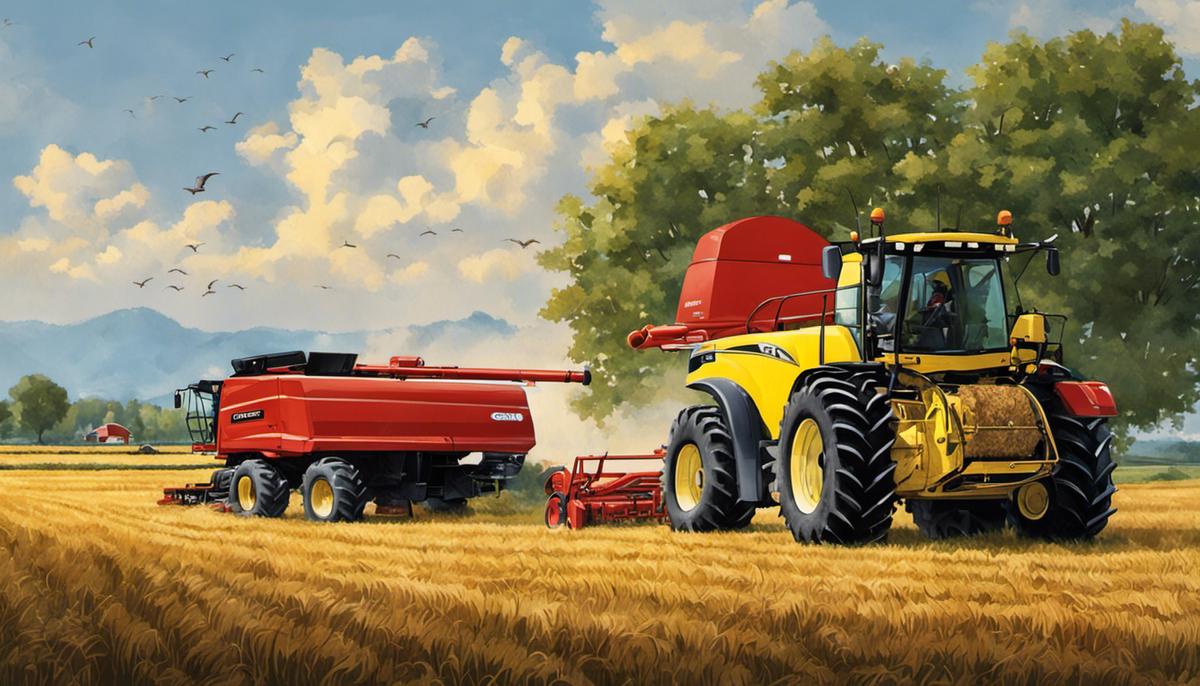
Technological Advancements in Farm Equipment
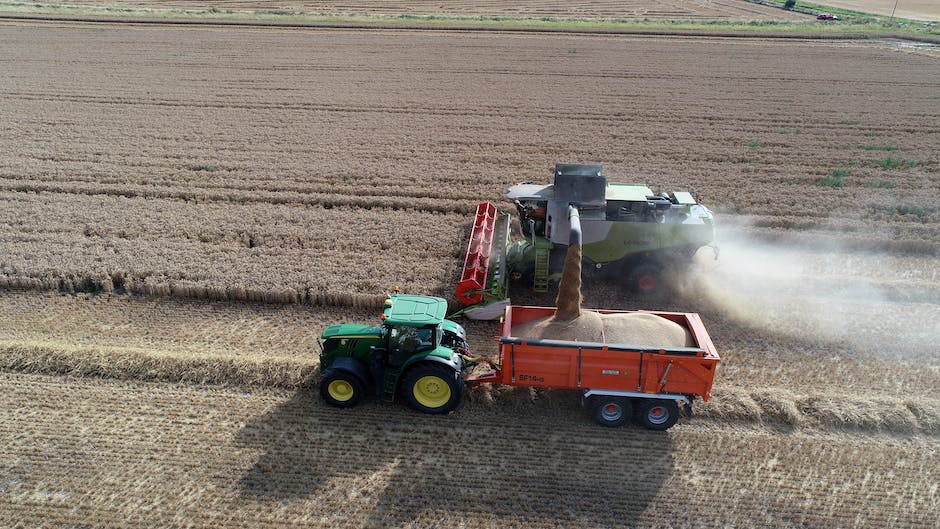
Safety Measures and Maintenance of Farm Equipment
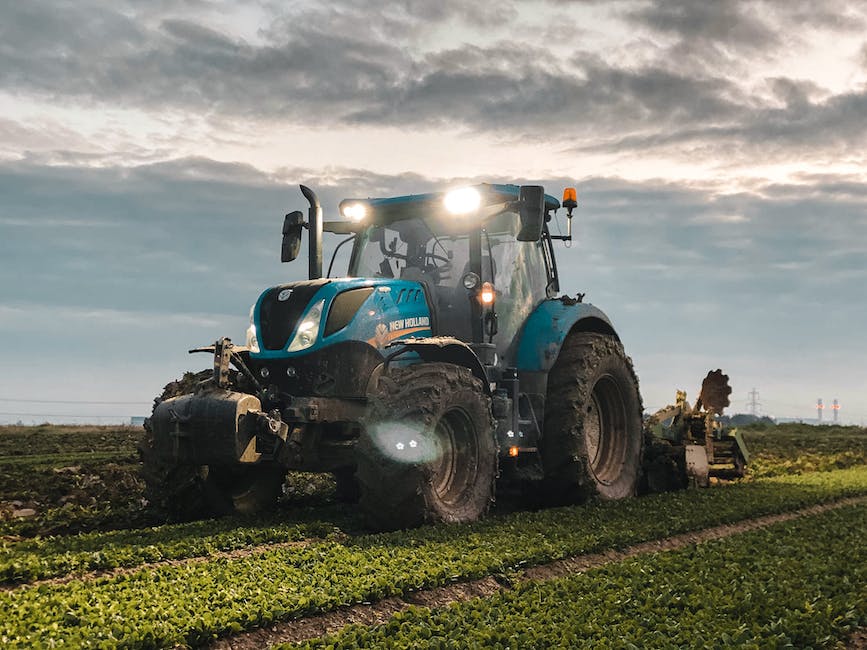
Choosing and Investing in Farm Equipment
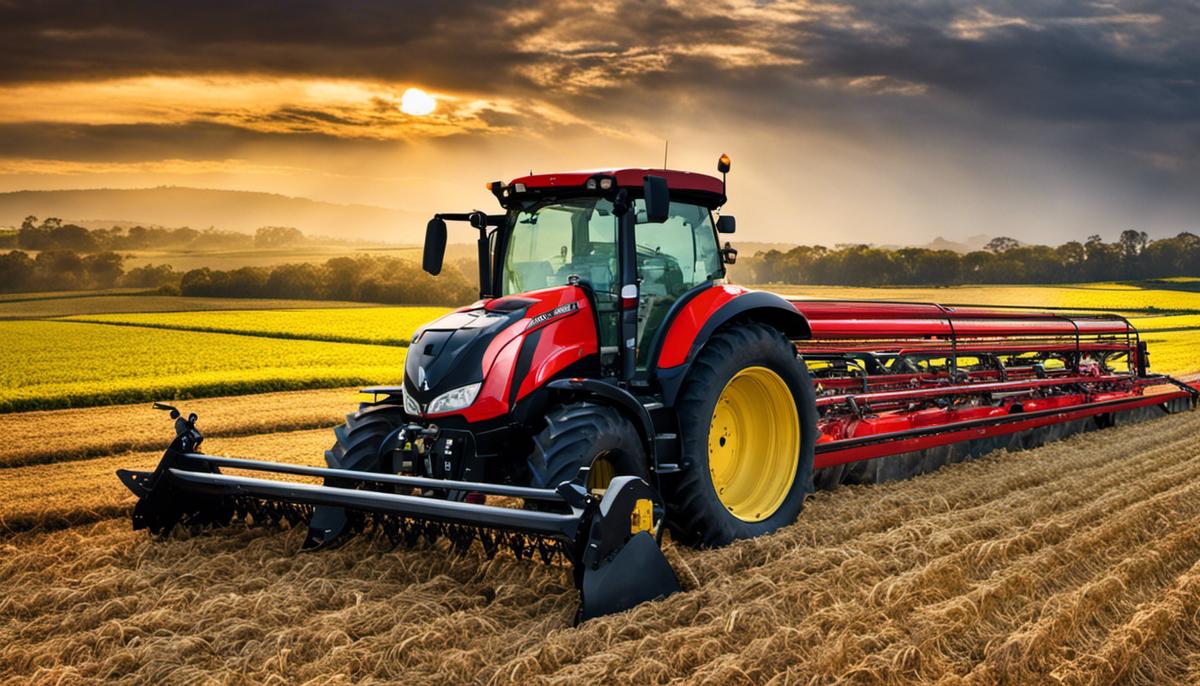
Innovations and Future Trends in Farm Equipment
